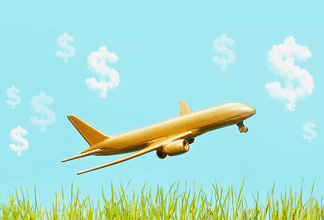Missing the Pre-Pandemic Days? Take Off the Rose-Coloured Glasses
Written by Tamar Satov | Published on June 9, 2021
Written by Tamar Satov | Published on June 9, 2021
More than a year into the pandemic, you might find yourself longingly reminiscing about the "before" times. Everything from parties to vacations to water-cooler chats with colleagues may be occupying your thoughts in nostalgic fashion.
That's no surprise to Edmonton-based author David Berry, who did a deep dive into the history and cultural impacts of such wistful recollections in his recently released book, On Nostalgia. Therein he cites research that shows the most common "triggers" for nostalgia are negative emotions — including loneliness, anger, fear and boredom — sentiments that are coming up on most of our bingo cards right now.
Furthermore, we are especially prone to nostalgia when our sense of identity is under threat, he says. "If you can no longer do most of the things that give you a sense of identity, and you have no idea what the future will look like, nostalgia is absolutely critical," says Berry. "It's a way to hold on to who we are."
But while this universal aspect of the human condition can be restorative — not only in providing that sense of self, but also by creating warm, fuzzy feelings that can temporarily improve our mood — nostalgia can be a double-edged sword that occasionally throws us into the depths of despair.
"Sometimes this sense of the past is paralyzing. We've all seen people who get stuck in the past and spend all their time looking back," says Berry. "But if you're not looking in front of you, that's a good way to trip."
If nostalgia for the past is tripping you up and creating more sadness than comfort, it may be helpful to keep in mind that your pre-COVID days probably weren't as great as you remember them. That's because memory is notoriously unreliable — both in terms of what we tend to remember, and the details of the memories themselves.
How memory works
Experiences must have some level of emotion or meaning for our brains to hang on to them, which is why we forget most of the boring, inconsequential stuff that happens day to day, says Berry. The more meaningful or emotional an experience is, the more often we will revisit that memory, which helps reinforce it in our minds. And, aside from really traumatic events that hijack our thoughts in the form of PTSD, we tend to replay generally pleasant memories, which is why those are the ones that usually stick. (Big market upswings, for example, are so much nicer to remember than small dips, aren't they?)
But none of our memories — good or bad — are fixed. Nearly every time we recall something, our brain rewrites the memory slightly. “We don't do it consciously, but we're subtly changing it," says Berry.
Indeed, research done on "flashbulb" memories — such as the terrorist attacks on September 11 — has looked at people's recollections of events in the immediate aftermath and then months or years later, and found that the details of their memories change over time — and often don't correspond to the "objective" truth seen in video evidence.
"They may start unconsciously pulling in their friends' memories, or things they saw on the news, or how they felt when they were remembering it, and it all becomes part of this stew," explains Berry. The same thing happens with interpersonal memories, which is why siblings often have vastly different recollections of shared events from their childhood, he adds.
What's the upshot?
If nostalgic reveries about past experiences bring you comfort, don't worry about whether those recollections are accurate.
"I miss going to the movies, but I'm not thinking about the time a tall guy sat in front of me, or all the terrible movies I've seen. Consciously or not, I black out every bad part of the experience because I need to remember a good time that I enjoyed that was important to me," says Berry. "As long as you don't go too far down that rabbit hole, it's restorative and gives you that sense of self."
But if your memories of happier times lead you to focus on the negative aspects of what's missing in your life right now, it can help to be mindful of the "whole truth" of your pre-pandemic experiences. Sure, you might miss the camaraderie of being at the office, but do you miss the stressful commute and that annoying colleague who spoke on the phone too loudly all day?
"I would try to focus on what you're gaining from being at home — such as spending more time with your kids or being able to see your partner in a way you didn't before — as opposed to what you miss," says Berry. Some investors may also be able to focus on the opportunities afforded to them — and their portfolios — as a result of the pandemic. In any case, Berry acknowledges that having this awareness to catch your thoughts in the moment is difficult.
Either way, you can take solace in knowing that once the pandemic is in the rear-view mirror, you'll likely see this period through rose-coloured glasses, too. Berry offers an example: "The Great Depression was a terrible time, but people remembered it as a time of coming together. It'll take time — but you won't remember the bad things as much as the little bits of good."
Are you seeing the past through rose-coloured glasses? What did you think of this perspective on memory and nostalgia? Leave a comment* to share your top picks.
*Comments only enabled for clients. Not a client? You can open an account or get a free practice account. If you are a client, sign in to comment or see what others are saying.
RBC Direct Investing Inc. and Royal Bank of Canada are separate corporate entities which are affiliated. RBC Direct Investing Inc. is a wholly owned subsidiary of Royal Bank of Canada and is a Member of the Canadian Investment Regulatory Organization and the Canadian Investor Protection Fund. Royal Bank of Canada and certain of its issuers are related to RBC Direct Investing Inc. RBC Direct Investing Inc. does not provide investment advice or recommendations regarding the purchase or sale of any securities. Investors are responsible for their own investment decisions. RBC Direct Investing is a business name used by RBC Direct Investing Inc. ® / ™ Trademark(s) of Royal Bank of Canada. RBC and Royal Bank are registered trademarks of Royal Bank of Canada. Used under licence.
© Royal Bank of Canada 2025.
Any information, opinions or views provided in this document, including hyperlinks to the RBC Direct Investing Inc. website or the websites of its affiliates or third parties, are for your general information only, and are not intended to provide legal, investment, financial, accounting, tax or other professional advice. While information presented is believed to be factual and current, its accuracy is not guaranteed and it should not be regarded as a complete analysis of the subjects discussed. All expressions of opinion reflect the judgment of the author(s) as of the date of publication and are subject to change. No endorsement of any third parties or their advice, opinions, information, products or services is expressly given or implied by RBC Direct Investing Inc. or its affiliates. You should consult with your advisor before taking any action based upon the information contained in this document.
Furthermore, the products, services and securities referred to in this publication are only available in Canada and other jurisdictions where they may be legally offered for sale. Information available on the RBC Direct Investing website is intended for access by residents of Canada only, and should not be accessed from any jurisdiction outside Canada.

Read on to learn about Tiffany's investing journey.

We look at things you might want to consider before adding these stocks to your portfolio.

We look at some factors when considering investing in two luxury retail and sporting goods